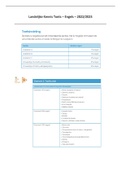Landelijke Kennis Toets – Engels – 2022/2023
,TIP:
1. Every question marked in the colour red is what I remember from the official test.
2. Aka = also known as (in the test they can refer to different concepts such as uncountable
nouns or non-count nouns which mean the same)
,Word class - part of speech
1. Noun = identifies a person, thing, idea, quality, or state such as anger, courage, life,
luckiness etc.
2. Articles (Lidwoorden) There are 3: The – A – An → most used in front of the noun.
Example: the dog, a dog, an apple.
3. There are uncountable nouns & countable nouns
Uncountable nouns (= aka non-count nouns): Used with singular verbs, we cannot
use it with articles: a/an & cannot add the letter -s. Example words: sugar, water, air,
rice, music, knowledge, beauty, anger, fear, love, money, spaghetti, research, safety,
evidence, bred, news, traffic, trouble, snow, work.
You cannot count these words → one music, two music(s) – this doesn’t exist.
Therefore, music is an uncountable noun.
Countable nouns (= aka count nouns): have singular & plural forms +s. You can count
the noun and almost always add the letter -s, except with irregular nouns made
plural. For example: one man – forty men / one woman – twelve women. Regular
nouns → one girl, two girls / one table, four tables.
4. Verb = describes actions, events, situations & changes. Example: the dog sleeps,
Maria is watching television.
5. Adjective = describes a noun, giving extra information about the noun. Example: An
exciting adventure, a green apple, a tidy room.
6. Adverb = gives information about a verb, adjective or another adverb which can
make the meaning stronger or weaker. Most adverbs end in -ly. The adverb often
appears between the subject and its verb. Example: She nearly lost everything, I
really don’t care, I so want to go to the concert. Some adverbs tell the location of an
action, or where it occurred, example: He lived in the north of France. The north of
France is where he lives. This adverb tells you something about the verb: Live.
Other adverbs like this would be: here, there, everywhere, somewhere,
underground, outside, upstairs, downstairs etc. Examples of adverbs that tell when
an action occurred, or its time, include: First, last, tomorrow, yesterday, today, early,
later, often, never, monthly, usually, always etc.
, 7. Pronoun = used instead of a noun that’s already known/mentioned. Cindy(noun) left
early because she was tired. She is the (personal) pronoun. Personal pronouns: I, me,
you, he, him, she, her, it, we, us, they, them. Possessive pronouns: mine, yours, his,
hers, its, ours, yours, theirs. This iPad is mine. Mine is the (possessive) pronoun.
8. Preposition = used in front of nouns or pronouns. Examples: on, in, under, behind,
over, near, before. He sat on the chair, he drove over the bridge, they were sitting by
the tree, the sun is above the clouds. When you use an English preposition, you have
to think literally. You cannot say: I am on school, but I am at school, because ‘at’ is
used when talking about locations.
9. Conjunction = holds words, phrases, and clauses together. There are 3 different
kinds of conjunctions – coordinating, subordinating, and correlative conjunctions.
1. Coordination conjunction
They can join words, phrases and independent clauses. There are 7 of them, and they’re
easy to remember if you can just remember FAN BOYS:
• For - Explains reason or purpose (just like “because”) I go to the park every Sunday, for I
love to watch the ducks on the lake.
• And - Adds one thing to another I go to the park every Sunday to watch the ducks on the
lake and the shirtless men playing soccer.
• Nor - Used to present an alternative negative idea to an already stated negative idea I
don’t go for the fresh air nor really for the ducks. Honestly, I just like the soccer.
• But - Shows contrast: The soccer in the park is entertaining in the winter, but it’s better
in the heat of summer.
• Or - Presents an alternative or a choice The men play on teams: shirts or skins.
• Yet - Introduces a contrasting idea that follows the preceding idea logically (like “but”) I
always take a book to read, yet I never seem to turn a single page.
• So - Indicates effect, result or consequence I’ve started dating one of the soccer
players, so now I have an excuse to watch the game each week.
2. Subordinating conjunction
A subordinating conjunction always introduces a dependent clause, tying it to an
independent clause. In contrast to coordinating conjunctions, a subordinate conjunction can
often come first in a sentence. This is due simply to the nature of the relationship between
the dependent and the independent clause. In English, there are lots of subordinating
conjunctions, but the most common ones are: after, although, as, because, before, how, if,
since, until, once, that, than, though, when, where, whether, and while. Here are a few
examples of how subordinating conjunctions are used:
• “Because of you, I never stray too far from the sidewalk”.
• “If you leave me now, you’ll take away the biggest part of me”.
• “When I see you smile, I can face the world”.




